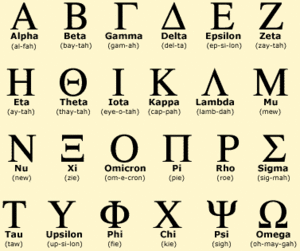
IT'S ALL GREEK TO ME
A flyer was recently placed in my office mailbox with the title, "Corazones Unidos Siempre." This didn't mean a thing to me but, fortunately, below that it said: "Chi Upsilon Sigma National Latin Sorority, Inc." Ah ha! But then I was confused as to whether this was a Greek organization or a Latino organization. If it is a Latin organization, as they claim, why does it have a Greek name? I don't know any Latino people with Greek names, or Greeks with Latino names. There is a student in one of my classes whose last name is Papadogeorgopoulos, and I'm fairly certain she is not Latino or a member of Chi Upsilon Sigma.
Why don't Greek-Americans have a Greek fraternity or sorority? African-Americans have a Greek fraternity (Alpha Phi Alpha), Jewish students have a Greek fraternity (Phi Sigma Nu), and Native-Americans have Zeta Beta Tau. Latino-Americans also have Phi Sigma Nu for those Latinos who don't like Chi Upsilon Sigma. However, if you are a Latino going to school in Puerto Rico, you won't find either of those organizations there. All this doesn't make much sense to me. The only logical group to have a Greek organization is the Greeks, but they don't. I suspect the Turks, who have not gotten along well with the Greeks, also don't have Greek organizations in their schools, but I can't say for sure.
Fraternities have traditionally been male organizations that unofficially promote partying, drinking beer and having sex with women. I thought all fraternities and sororities were gender specific until I was inducted, as an honorary member, into the mixed-gender fraternity, Delta Mu Delta, and later Delta Sigma Pi. Now I have brothers who are female. I'm not complaining. If they would have had such fraternities when I was in college, I'm sure I would have preferred them. Sororities came along about 75 years after the first male fraternity was established, but were not given Greek names until the early 1900's.
There is a national Association of College Honor Societies that is made up of 62 different Greek honor societies. Who would have thought that we needed so many honor societies? Evidently there are lots of people who want to say they are, or were, in an honor society. I've never heard of any honor societies that are not Greek. The citizens of Greece must be very proud.
Probably the best-known honor society is Phi Beta Kappa, which was founded way back in 1776 at the College of William and Mary. It is also considered to be the first Greek-letter student society in North America. I guess they thought about all of the famous Greek philosophers like Plato, and decided it would be more prestigious to be associated with them than, say, Polish philosophers. Otherwise Chi Upsilon Sigma might be Ce Uu Ss.
The Greek alphabet has 24 letters. If you are into mathematical permutations, and you consider the fact that some Greek organizations have two Greek-letter names and others have three-letter names, then the possible number of unique names for Greek organizations (permutations of 2 and of 3) is greater than the number of students going to college in the world. (It works out to 5.77474E+22 possible organizations.)
Chi Upsilon Sigma is a Latino organization in the United States with a Greek name and a Spanish slogan (Corazones Unidos Siempre). There is something basically wrong with that. It is like discovering that my student, whose family name is Papadogeorgopoulos, is really a French-Irish girl from Alabama who speaks Arabic.
I suggest that Chi Upsilon Sigma change their slogan from Corazones Unidos Siempre to either the English version: United Hearts Always, or the Greek version, Ενωμένες καρδιές πάντα. This would reduce the cultural confusion from having a linguistic Ménage à trios, and keep their organization from sounding more exotic than it is. Having spent almost 30 years in higher education, I can say, with a fair amount of certainty, that there are no "exotic" student organizations.
Regardless of the stated purpose of Greek organizations, their unwritten slogans are pretty much the same: Μπύρα και γυναίκες, for the fraternities and Μπύρα και τύποι for the sororities. If you are wondering what those mean, don't ask anyone in a Greek fraternity or sorority. It's all Greek to them.